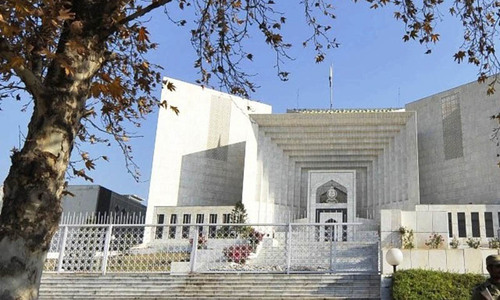ISLAMABAD: The Islamabad High Court on Thursday appointed eminent lawyers Hamid Khan, Khalid Anwar and Makhdoom Ali Khan as amici curiae to assist it in petitions filed by two lawmakers against the appointment of two members of the Election Commission of Pakistan (ECP).
The petitioners — Senator Mohammad Javed Abbasi and National Assembly member Dr Nisar Ahmed Cheema — are members of the parliamentary committee that recommends names of ECP members.
After a preliminary hearing, IHC Chief Justice Athar Minallah appointed the amici curiae, clubbed these petitions with an already pending identical petition and adjourned the hearing till Oct 11.
On Aug 22, President Arif Alvi appointed Khalid Mehmood Siddiqui from Sindh and Munir Ahmed Kakar from Balochistan against the two ECP positions, which had fallen vacant after completion of the terms of Abdul Ghaffar Soomro and retired Justice Shakeel Baloch from the respective provinces.
The lawmakers challenged the notification issued by the president for the appointment of Mr Siddiqui and Mr Kakar as ECP members from Sindh and Balochistan, respectively.
Petitioners term president’s notification on appointment of ECP members violation of Articles 213, 218
In their petitions, the lawmakers contended before the court that since Prime Minister Imran Khan and Leader of the Opposition in the National Assembly Shahbaz Sharif had failed to develop consensus on the names of ECP members, the parliamentary committee on the appointment of the chief election commissioner and ECP members was deliberating upon the names for vacant positions in the ECP.
According to the petitions, it was a surprise for the lawmakers that instead of following the procedure laid down by the Constitution and the superior courts, President Alvi had made the appointments through his discretionary powers.
The petitions said that the criteria for appointment of the chief election commissioner and ECP members had been provided in the Constitution.
The petitions contended that the notification issued for the appointment of ECP members on Aug 22 was in violation of Articles 213 and 218 of the Constitution.
The petitions pointed out that due to the “grave illegality, the chief election commissioner has refused to administer oath” to the newly appointed ECP members.
According to the petitions, there is no constitutional provision which allows the president to appoint Mr Siddiqui and Mr Kakar by invoking his discretionary powers. After the passage of the 18th Constitution Amendment, the president has lost his discretion to appoint members of the ECP.
The petitioners said the president, prime minister and parliamentary affairs secretary could not complete the constitutional process as a five-member Supreme Court bench had specifically provided guidelines for appointments in the ECP.
They said the appointment of both ECP members-designate had been made without following the due process and that it was marred with nepotism and favoritism. They requested the court to set aside these appointments.
The petitions cited President Alvi, Prime Minister Imran Khan, the parliamentary affairs secretary, CEC, Mr Siddiqui and Mr Kakar as respondents.
The petitioners said the president’s decision to appoint the two ECP members was unconstitutional as it was issued “in violation of clauses 2A and 2B of Article 213 of the Constitution”.
The ECP, in response to an already pending petition moved by Barrister Jahangir Khan Jadoon against the appointment of the two ECP members from Sindh and Balochistan, filed a reply in the IHC, saying that the CEC had declined to administer the oath because “the appointment of the new members of the ECP in question has been made by the President of Pakistan without adopting the procedure laid down in clauses 2A and 2B of Article 213 of the Constitution”.
Explaining the clauses, the ECP stated that under Clause 2A, “the Prime Minister shall in consultation with the Leader of Opposition in the National Assembly forward three names for appointment of the commissioner to a Parliamentary Committee for hearing and confirmation”.
Clause 2B explained the composition of parliamentary committee, said the ECP reply.
According to the ECP, the president not only violated these clauses but also “bypassed” the parliamentary committee while making these appointments.
Published in Dawn, October 4th, 2019















































Dear visitor, the comments section is undergoing an overhaul and will return soon.